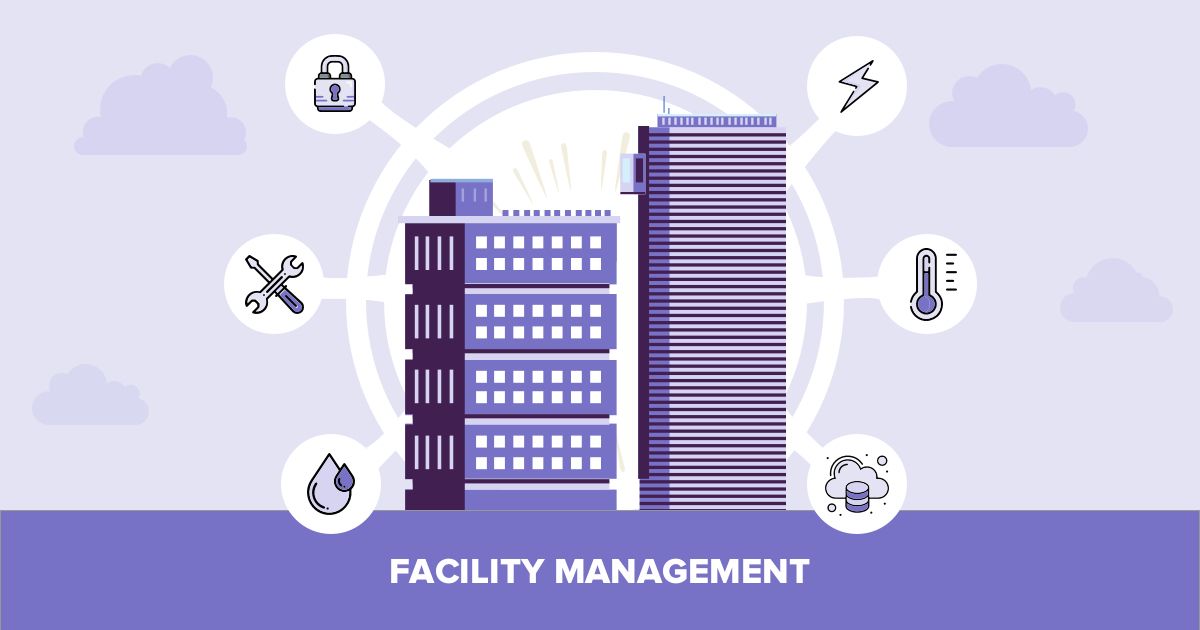Facility Management-- Streamlined Procedures and Cost Financial Savings
Facility Management-- Streamlined Procedures and Cost Financial Savings
Blog Article
Secret Fads Forming the Future of Facility Administration in 2024
As we look in advance to 2024, the landscape of center monitoring is positioned for considerable makeover, driven by several essential trends. The integration of smart structure modern technologies and a shift in the direction of data-driven decision-making assurance to boost functional effectiveness while prioritizing sustainability in technique.
Smart Structure Technologies

Smart building modern technologies incorporate a broad variety of systems, consisting of intelligent illumination, HVAC controls, and protection systems. By integrating these systems, facility managers can keep an eye on and readjust parameters in real-time, resulting in significant reductions in power waste and functional prices. Wise sensing units can detect occupancy levels and adjust lighting and temperature accordingly, ensuring that energy is only used when necessary.
Moreover, these innovations assist in boosted information collection, allowing organizations to track usage patterns and recognize chances for additional renovations. The implementation of smart structure modern technologies not just adds to sustainability goals yet additionally develops healthier workplace that can improve worker efficiency and fulfillment.
As we move into 2024, the fostering of clever building technologies will likely increase, showing a wider shift in the direction of more intelligent, responsive, and lasting facility management practices.
Data-Driven Choice Making
Progressively, organizations are leveraging data-driven choice making to improve facility monitoring methods. By utilizing information analytics, center managers can obtain actionable understandings that substantially enhance operational effectiveness and resource appropriation. The combination of advanced modern technologies, such as IoT sensing units and real-time monitoring systems, allows the collection of large quantities of data on structure performance, tenancy rates, and power usage.
This wealth of info allows center managers to determine fads, anticipate upkeep requirements, and proactively address problems before they rise. Anticipating analytics can forecast devices failings, decreasing downtime and fixing costs. Furthermore, information visualization devices help with better communication among stakeholders, making certain that informed choices are made collaboratively.
Moreover, data-driven techniques enhance critical planning by enabling facility managers to evaluate the performance of existing practices and make notified options pertaining to investments in modern technology or framework. As companies increasingly prioritize operational excellence, data-driven choice production is positioned to come to be a cornerstone of successful facility administration approaches in 2024 and past. Inevitably, the ability to leverage data effectively will equip organizations to create much more effective, effective, and durable centers.
Sustainability and Eco-friendly Practices
The emphasis on data-driven decision making naturally aligns with the growing concentrate on sustainability and green practices within facility management. As companies significantly focus on ecological obligation, facility managers are leveraging analytics to optimize source use, minimize waste, and reduce carbon footprints. This tactical method enables the integration of energy-efficient systems, such as LED lighting, clever HVAC controls, and eco-friendly power resources into center procedures.
Furthermore, click to investigate the implementation of lasting techniques expands beyond energy intake. Center managers are adopting eco-friendly products and promoting wikipedia reference recycling efforts to develop a circular economy within their centers. This not just boosts the environmental profile of the organization yet likewise fosters a society of sustainability among workers.
Compliance with ecological policies is an additional important aspect driving the adoption of environment-friendly methods. By making use of information analytics, center supervisors can check conformity metrics and determine locations for renovation, making sure adherence to worldwide and local sustainability requirements.
Hybrid Work Models
A significant change towards hybrid work models is reshaping the landscape of center management in 2024. This paradigm combines remote and in-office job, demanding a reevaluation of area usage, resource allotment, and worker interaction methods. Organizations are significantly identifying the significance of adaptable work spaces that accommodate diverse requirements and choices.
Center managers should adjust by applying flexible office layouts that support collaborative initiatives while offering locations for concentrated job. This includes the assimilation of innovation to facilitate smooth communication and collaboration among in-office and remote employees. Smart structure services, outfitted with sensors and analytics, enable real-time tracking of room usage, enabling companies to optimize their environments successfully.
Moreover, crossbreed work models emphasize the need for efficient facility management that focuses on worker experience. In significance, the hybrid job design is revolutionizing center monitoring, encouraging a positive technique Web Site to meet the developing needs of the labor force.
Enhanced Passenger Health
As companies accept hybrid job models, an enhanced concentrate on passenger health is ending up being important to facility administration approaches. Facility Management. This change acknowledges that a pleased and healthy and balanced workforce directly influences productivity and retention rates. Facility managers are now focusing on settings that advertise mental and physical well-being, incorporating elements such as all-natural lighting, biophilic layout, and available wellness sources

Technology plays an important function in this evolution. Smart building systems can check environmental factors and change settings in real-time, making sure optimal comfort degrees - Facility Management. In addition, feedback mechanisms, such as tenancy sensing units and worker studies, allow facility managers to constantly fine-tune wellness campaigns based upon owner demands.

Verdict
In 2024, the future of facility management will certainly be considerably affected by the combination of smart structure technologies and data-driven decision-making, cultivating improved functional efficiency. Sustainability initiatives will focus on environmentally friendly methods, while the emergence of crossbreed work versions will require adaptable office styles. A heightened focus on passenger health through sophisticated HVAC systems and biophilic layout will contribute to much healthier job environments. These trends jointly emphasize the evolving landscape of facility administration in feedback to modern challenges and chances.
Facility managers are advertising and taking on eco-friendly materials recycling initiatives to develop a round economic situation within their centers.A substantial change in the direction of crossbreed work designs is reshaping the landscape of center monitoring in 2024.Moreover, hybrid job versions stress the requirement for efficient facility management that prioritizes staff member experience.As companies accept hybrid job designs, an enhanced focus on passenger health is coming to be integral to facility management techniques.In 2024, the future of center management will be dramatically affected by the integration of wise building technologies and data-driven decision-making, fostering improved operational efficiency.
Report this page